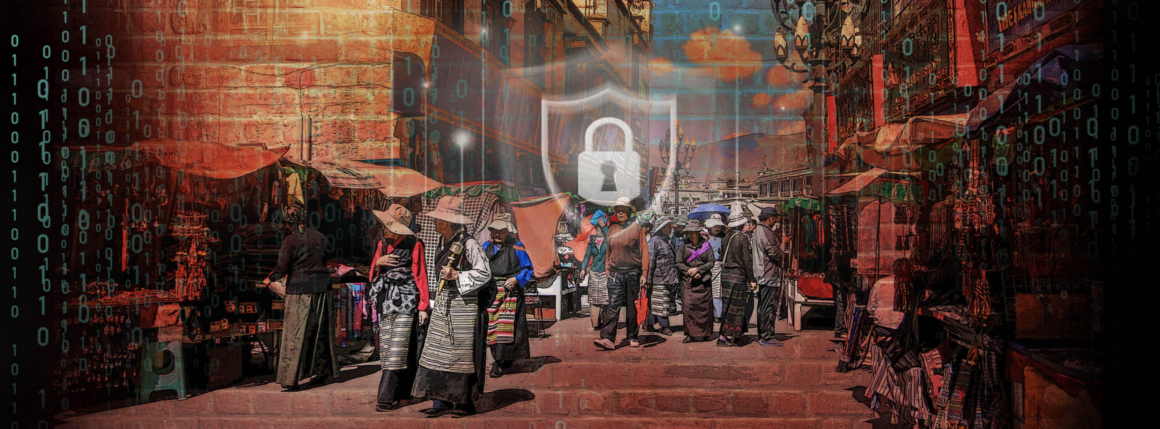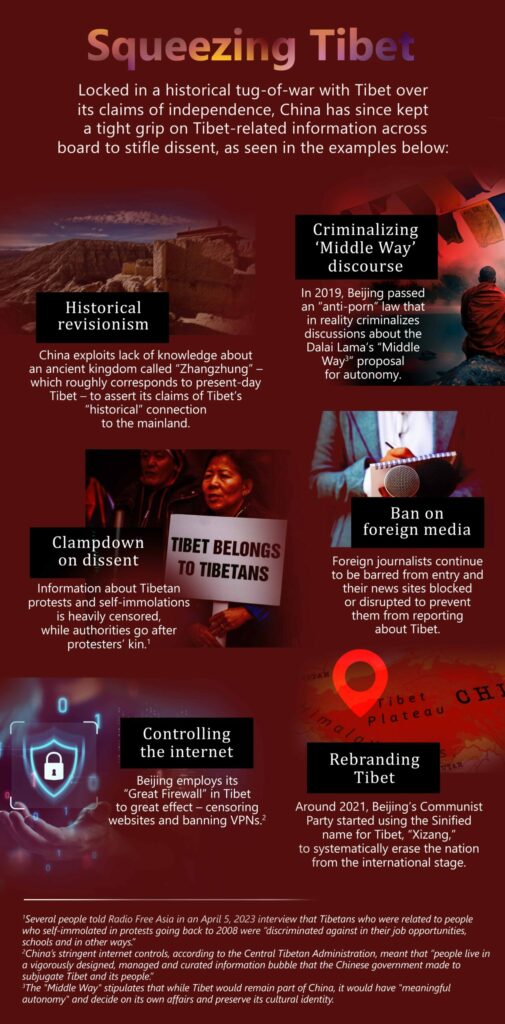Tibet’s ever-expanding great firewall
Chinese authorities have long stifled the flow of information in Tibet by relying on mass surveillance campaigns and forcing Tibetans to turn against each other.
Initial reports from independent media and Tibetans in exile said that pop artist Tsewang Norbu shouted “Free Tibet!” before setting himself on fire in front of the historic Potala Palace – the first Tibetan with an educated, urban background to commit an act of self-immolation to protest Chinese rule.
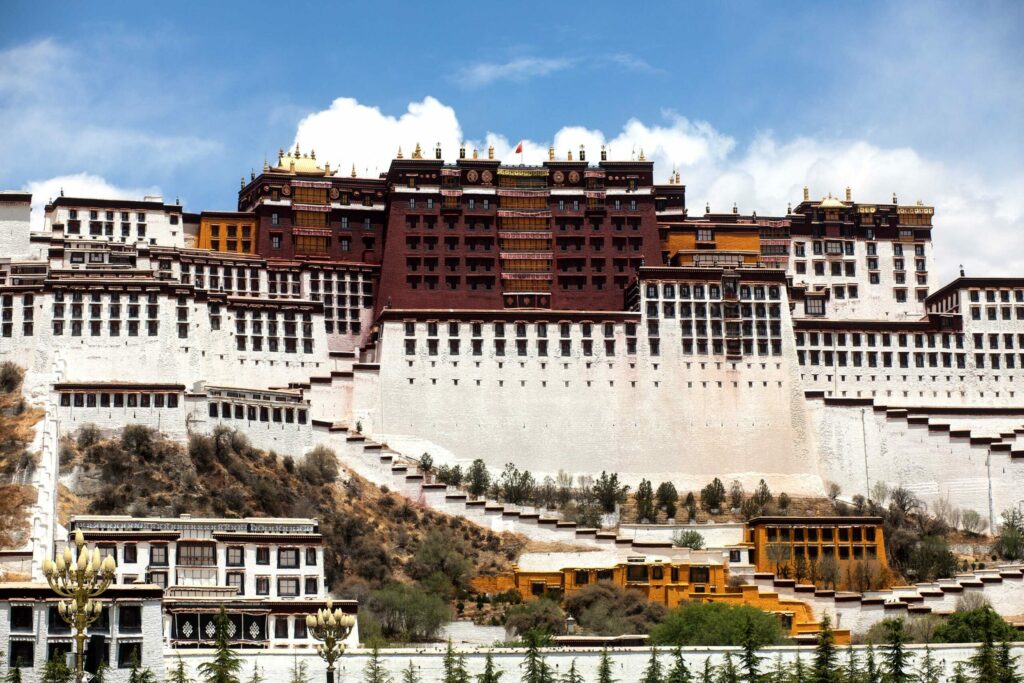
Lhasa, Tibet - May 12, 2019: The Potala Palace was the residence of the Dalai Lama until the 14th Dalai Lama fled to India during the 1959 Chinese invasion. It is now a museum and World Heritage Site.
The Potala Palace in the Tibetan capital city of Lhasa, once the residence of the Dalai Lama until the 1959 invasion of China, was witness to a self-immolation act in 2022 by a young Tibetan pop artist who yearned for Tibet’s independence from China. (Photo: Shutterstock / Nicole Glass Photography)
But as soon as the young celebrity went up in flames, Chinese authorities sprang into action and removed his body from the scene, according to witnesses who spoke to exiled Tibetans in confidence. Despite hundreds who saw the act, the ease with which authorities tracked and monitored people’s devices snuffed out all evidence of Norbu’s grim end.
Indeed, it took more than a week for independent media to confirm Norbu’s death. A month after the incident, the Chinese Foreign Ministry hinted at a mentally ill man who “attempted suicide by self-immolation” yet survived after being given immediate treatment.
How easily Chinese authorities vacuumed up all evidence of the death of a well-known Tibetan at the prime of his life “shows everything” about Tibet, said Lobsang Gyatso Sither, director of technology at the Tibet Action Institute, during a recent webinar organized by the digital rights group EngageMedia on censorship in Tibet.
When Norbu set himself aflame in front of the former seat of Tibetan government prior to the Chinese occupation of Tibet in 1951, there was “anecdotal evidence of thousands of people who have cameras in that area,” Sither said.
“But we have not received any photos,” he said. “That shows that there is no free speech in Tibet.”
Democracy advocates and Tibetans-in-exile like Sither believe that the difficulty confirming the details of Norbu’s death illustrates the extreme state of repression in Tibet, which has been ranked as the least free country for three consecutive years (2021, 2022, 2023), according to U.S.-based rights group Freedom House.
Tibet has been under Chinese occupation and kept under control by the Chinese Communist Party (CCP) government in Beijing for six decades. A range of tactics to surveil and censor Tibetans – such as CCTV cameras, bugged homes, and most recently, the monitoring of text and voice messages – has not only restricted free speech inside Tibet but also filtered the information pouring in from a large community of Tibetan activists abroad.
For the International Tibet Network, a global coalition of Tibet-related non-governmental organizations, Tibet has become “China’s laboratory for repression” and a place where “systems of mass surveillance and abject control” are honed.
After all, then CCP secretary for Tibet Chen Quanguo introduced policies that increased the monitoring and surveillance of all Tibet households from 2011 to 2016, then extended these repressive measures to target Muslim Uyghurs when he assumed the role of Xinjiang’s party secretary in 2016.
Community policing
Tibet has an estimated population of 3.6 million. Based on China’s 2020 census, ethnic Tibetans make up 86 percent of the people in what Beijing calls the Tibetan Administrative Region – half of a bigger plateau and the region China occupies – while Han Chinese make up about 12 percent.
At the Dec. 11 EngageMedia webinar, Sither said that while there had always been surveillance and restricted movement in Tibet, the Chinese government’s establishment of convenience police stations across major cities and rural villages in 2012 allowed greater control over residents’ movement and speech.
These police checkpoints – the brainchild of policymaker Chen Quanguo – became an easier way for the government to “surveil and harass” Tibetans, he added.
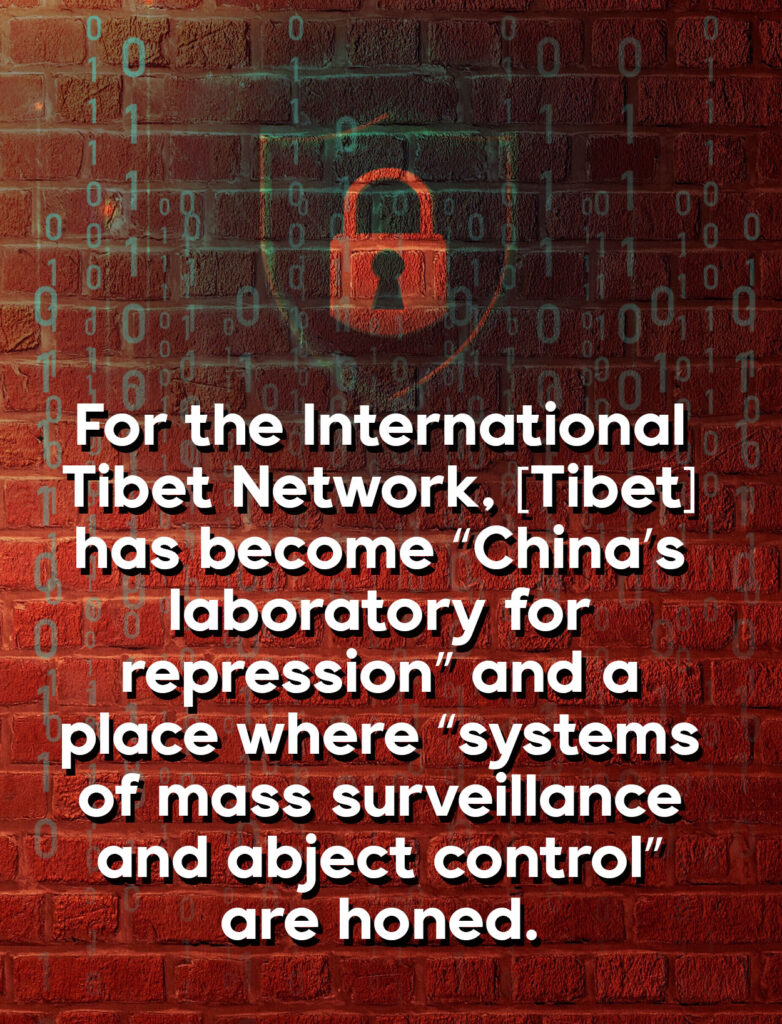
“Along with the physical structures, we all know China’s surveillance industry: CCTV in every location,” said Sither. “And basically, if you’re online, you have to give all your information. There‘s no way to have any activity online where you can be anonymous.”
A member of the 17th Tibetan Parliament-in-Exile, Sither said that besides the traditional segmenting of Tibetan communities, China also implemented an “advanced government household system” where “people are kind of forced to police each other.
According to a 2022 report by the India-based Tibetan Centre for Human Rights and Democracy (TCHRD), Tibetans with relatives who openly criticize Chinese authorities are forced to “choose between risking their own safety by doing nothing, reporting the individual to the police, or severing all contact with the loved one.”
Chinese laws and regulations require Tibetans to report any behavior that the CCP deems a threat to national security, which Tibetan analysts say has created a community rewarded for turning against each other and, in effect, destroying the Tibetan national identity.
In other words, Beijing has made tamping down dissent a family effort. For instance, according to Sither, relatives of persons who commit self-immolation – which the latest figures place at around 161 since 2010 – are typically held responsible for the self-immolator even as their loved one has passed away.
China’s monitoring and surveillance tools have also developed rapidly, Sither said, making it possible to monitor not only text conversations but also phone calls and voice recordings.
Pointing out that there are Chinese companies now using artificial intelligence to filter audio-based communications, he said, “there is a lot of surveillance in text conversations on, for example, WhatsApp, where China restricts all forms of communication. But now, there is a way to do that with voice and video calls.”
Remarked Sither: “When people are surveilled and everything is controlled, what happens? People are self-censoring themselves because everything they do is being monitored.”
According to the International Campaign for Tibet (ICT) the spy-on-neighbors regulations in Tibet are merely in accordance with China’s national laws, such as the 2014 Counterespionage Law, the 2015 National Security Law, and the 2017 National Intelligence Law.
But a strong undercurrent of religious suppression characterizes the Tibet version of these regulations. ICT argues that Beijing’s rules for Tibetans expand the definition of “counter-espionage to include activities like ‘ethnic secession,’ ‘ethnic dispute,’ and ‘using religion to endanger national security.’”
Beijing also appears to have revived a version of its reeducation forced labor programs abolished in 2013 to suppress ethnic minorities in Tibet and Xinjiang(officially the Xinjiang Uyghur Autonomous Region) in northwest China.
China has reportedly detained more than a million Muslims in internment camps in Xinjiang since 2017. On a smaller scale, thousands of Tibetans have also been forced into a mass labor program that allegedly includes denouncing the Dalai Lama while professing their loyalty to the CCP
Cutting off exiled Tibetans
Sither said that rights violations in Tibet continue partly because of the lack of information being exchanged with the international community.
“I think one of the things that’s important for any movement or any struggle is information on what’s happening, such as the rights abuses,” he said. “That’s a really important aspect of how you keep a movement alive.”
No independent media organizations exist inside Tibet; the only critical news sources are based overseas and run by Tibetans in exile maintaining secret contact with the few who are able to escape censorship tools.
Said Sither: “A lot of the information that permeates Tibet is through the diaspora community.”
Tibetans in exile number around 150,000 as of 2021, and are represented by the Central Tibetan Administration (CTA), the Tibetan government-in-exile based in India. The CTA is meant to be the voice advocating for Tibet’s freedom, as those within Tibet have limited political opportunities.
But with Tibetans’ movements and online activities heavily monitored, Tibetans in exile have struggled to communicate with those back home.
“That creates a problem in terms of what is the tool that you use,” said Sither. “Inside Tibet the only option is WeChat. You’re using a system that’s surveilled.”
Self-censorship has also made many Tibetans overseas — including those that are not engaged in activism — lose most or all contact with their families in the past decade, according to TCHRD’s 2022 report.
CTA member Ngawang Tharpa, who is also a cousin of the singer Norbu, has not been able to contact his family and friends since 2015, the report said.
Sither said that the open-source community has designed “a lot of tools” to help Tibetans skirt surveillance, including virtual private networks (VPNs), which enable users to conceal their public IP address while online. But, he said, unclear provisions in China’s cybersecurity laws have imposed legal hurdles to using these technologies.
He cited as an example a 2019 Chinese government directive on the types of online content that can be blocked or censored. According to the directive, information can be considered illegal if these “damage the interest or honor of the nation,” “jeopardize the nation’s security,” and “subvert state power,” among others.
China’s 2017 “intermediary liability law” has also been “implemented very differently” in Tibet to “repress people more,” Sither added.
“When you think about it, it’s intermediary liability: WeChat, Weibo,” he said. “But now it’s used to hold the group chat (administrators) liable for anything said in the group.”
China’s attempts to “dominate the narrative on democracy and human rights” have made the situation worse for Tibet, he said. “Apart from the United States and a few countries, holding China accountable for human rights has been challenging. We have not seen the larger global community condemn rights abuses in Tibet.”
Last Dec. 15, the European Parliament adopted a resolution calling out China’s rights abuses in Tibet, including its use of boarding schools to subject Tibetan minors to compulsory assimilation. Four months earlier, the United States slapped visa restrictions on Chinese officials linked to these schools.
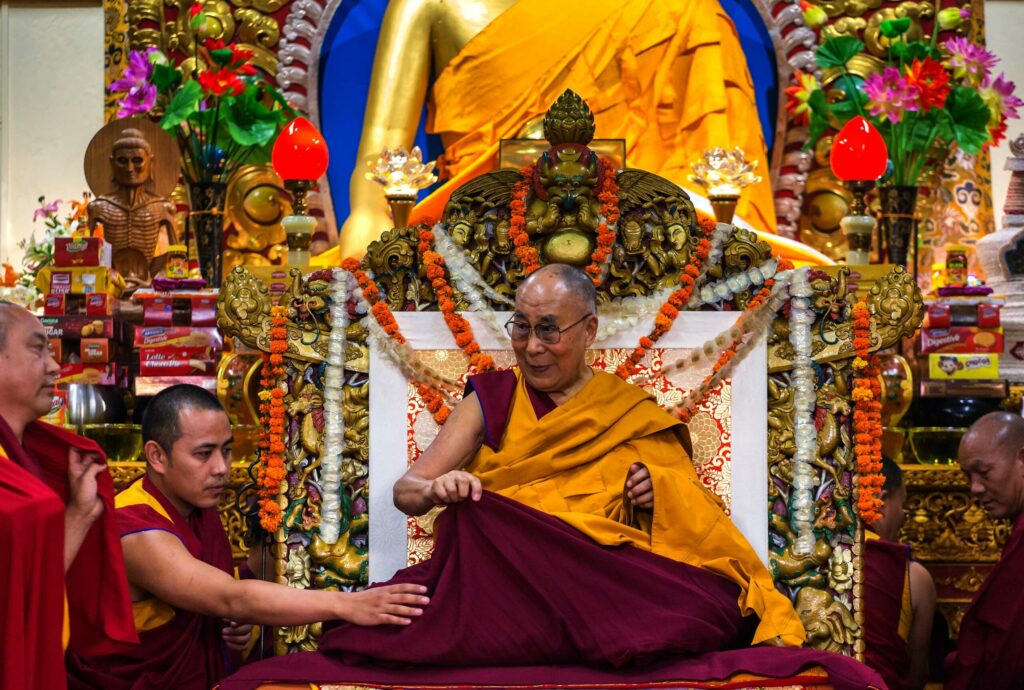
Dharamsala, India - June 6, 2017: His Holiness the 14 Dalai Lama Tenzin Gyatso gives teachings in his residence in Dharamsala, India.
The 14th Dalai Lama, Tenzin Gyatso, seen here delivering his teachings from his residence in Dharamsala, in the Indian state of Himachal Pradesh, is among the Tibetans now in exile. (Photo: Shutterstock / Mazur Travel)
Yet countries in Asia have yet to condemn China’s rights violations against Tibetans and other ethnic minorities, except Japan, which signed a joint statement condemning China’s human rights abuses in Tibet and Xinjiang in 2020.
Silence in the region is perceived to be a consequence of China’s heavy investments there, as well as its unique diplomatic ties to nations with rights violations like Cambodia.
Remarked Sither: “Having statements by governments on how this is cultural genocide in some ways – that is something required to make China listen.”



